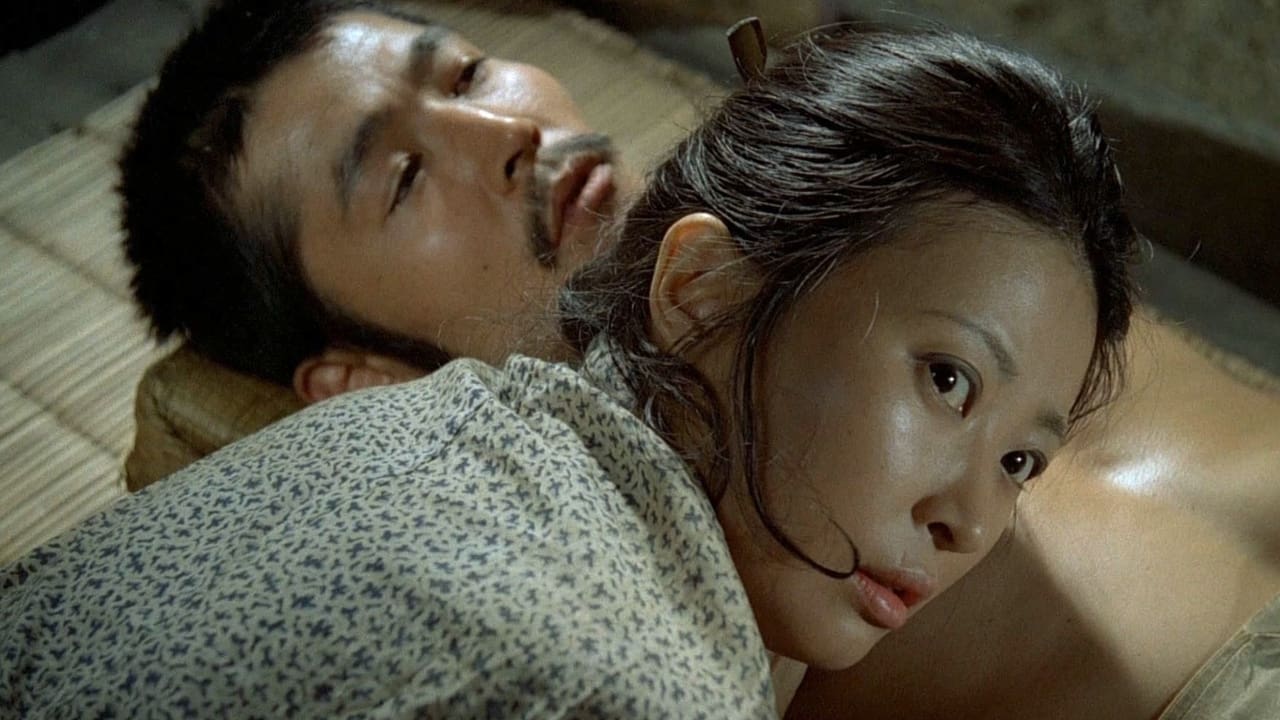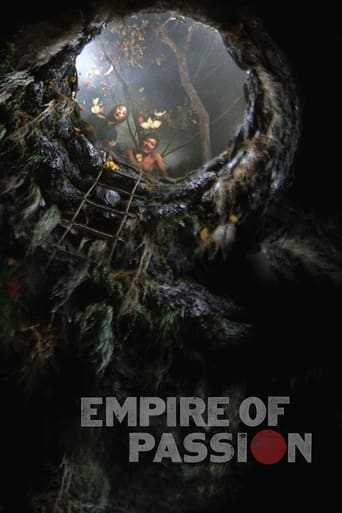Pluskylang
Great Film overall
Ceticultsot
Beautiful, moving film.
Rio Hayward
All of these films share one commonality, that being a kind of emotional center that humanizes a cast of monsters.
Janae Milner
Easily the biggest piece of Right wing non sense propaganda I ever saw.
treywillwest
As lushly beautiful looking as any film I've seen by Oshima, and that's saying something. Otherwise, this seems like his most conventional movie, at least on the surface. This is one of the director's few films that could be described as a genre work- in this case the tradition of the Japanese ghost story. Yet I also read it as a take on American Film Noir, what with sexual obsession driving a single man and a married woman to murdering the latter's husband. But it reverses that genre's gender tropes, making the young man the figure of sexual power who leaves the otherwise decent woman astray. Oshima is, I think, playing with the audience's patriarchal expectations, making them squirm a bit at the notion of a woman being so overcome by lust as to abandon her principles. "Isn't it man who is supposed to be virtuous yet corrupted by beauty???!!!" At one point, it is implied that the film is only a depiction of hearsay, even within it's own narrational space. This makes the work more true to Oshima's style- implying a vision of Japanese society as one characterized by hypocritical sexual repression, rumor, and superstition.
Falconeer
People usually think of "In the Realm of the Senses" when they hear Oshima's named mentioned. That film's graphic, semi-pornographic erotic scenes overshadowed director Nagisa Oshima's talents as a film maker. I believe his "Empire of Passion" is a superior film to that 1976 production, in many ways. Here we have a beautiful, and impeccably filmed 'ghost story' that truly succeeds in being "haunting." When the rick-shaw driver returns from the dead, after his wife and her corrupt young lover have murdered him, it is truly chilling. And this film succeeds at being very erotically charged, without explicit sex included. as in Oshima's earlier film, the illicit lovers seem to be obsessively, frantically addicted to each other sexually. Their couplings are feverish, even when things start to turn very dark in their lives. As in earlier works, the two main characters seem to have no control over their sexual appetites, and danger and violence only escalate their desire. "Empire of Passion" is masterfully filmed; the scenes in the mysterious forest with sunlight filtering through the branches overhead, or amidst pounding rain storms and mist-shrouded country roads, every frame of "Empire of Passion" is beautiful and carefully filmed. The scenes of the well are especially haunting and mysterious as the story draws to it's unhappy conclusion. A feeling of bitter hopelessness permeates every frame, and there isn't really anyone to sympathise with. Everyone seems so selfish and corrupt, except for the woman's young daughter, who is caught up in her mother's treachery. It's unfortunate that this film didn't get much attention, as people were most likely expecting another shock film like "In the realm of the senses." This one must have looked quite tame compared to that film, but i do believe this to be the superior of the two. I am looking forward to seeing earlier films from Nagisa Oshima.
MartinHafer
The very premise of this film was icky and turned me off completely. This isn't 100% surprising, as the director (Nagisa Ôshima) had a reputation for pushing the boundaries of taste and propriety. And, I really doubt he could have gotten away with making a film like this in the States. That's because the film shows a lecherous man raping a married older woman--and she LIKES it and becomes hopelessly devoted to him. And a bit later, when he suggests they murder her husband, she goes along with it and helps her lover strangle the poor guy! All this is very explicit (for a Japanese film this means lots of nudity but NEVER any crotch shots) and nasty.Although you might think the two would live happily ever after, this is not the case. The dead man was shoved into an old well--but his ghost haunts his wife throughout the film and even visits their daughter. And, she eventually loses her mind and only wishes to dies--even three years later. And, while the lover isn't quite as guilt-stricken, he's also a mess and the pair never have much chance to enjoy their new sordid lives--which I guess is trying to say that crime and evil doesn't pay.If you ignore the ickiness of the plot and how irresponsible it is, is it any good? Well, it's fair--neither great nor good. And, the viewer might wish to know that the rape myth is relatively common in Japanese films and anime--it's sure a different culture. I didn't particularly enjoy the experience.
Claudio Carvalho
In 1895, in a small village in Japan, the wife of the litter carrier Gisaburo (Takahiro Tamura), Seki (Kazuko Yoshiyuki), has an affair with a man twenty-six years younger, Toyiji (Tatsuya Fuji). Toyiji becomes jealous of Gisaburo and plots with Seki to kill him. They strangle Gisaburo and dump his body inside a well in the woods, and Seki tells the locals that Gisaburo moved to Tokyo to work. Three years later, the locals gossip about the fate of Gisaburo, and Seki is haunted by his ghost. The situation becomes unbearable to Seki and Toyiji when a police authority comes to the village to investigate the disappearance of Gisaburo."Ai no Borei" is a surreal and supernatural love story. The remorse and the guilty complex of Seki make her see the ghost of her murdered husband, spoiling the perfect plot of her lover. The cinematography is jeopardized by the quality of the VHS released in Brazil, but there are very beautiful scenes, inclusive "Ringu" and the American remake "The Ring" use the view of the well from inside in the same angle. The performances and direction are excellent making "Ai no Borei" a great movie. My vote is eight.Title (Brazil): "O Império da Paixão" ("The Empire of Passion")

